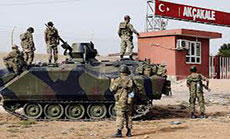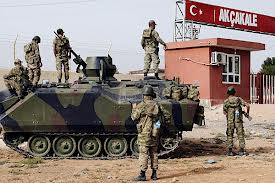Turkey Turns around: Bringing Al-Assad down is No Longer A Condition for Debate

Ibrahim Al Ameen - Al Akhbar
Out of all the countries concerned with the Syrian crisis, Turkey stands out today, without a clear decisive strategy, in fact some changes which are surfacing day after day lead to expecting some modifications take place.
 But it is not reasonable to expect Regeb Erdogan's near visit to Damascus. Actually it has become clear that Turkey is now obliged to abide by new policy, in liaison to all the changes the area has witnessed during this past year. The huge hardship which faces the Turkish leaders is that acting solo and taking a more personal line of action is no longer valid especially after launching operations of the Western Alliance against "ISIL", as well as the Iranian war against "ISIS."
But it is not reasonable to expect Regeb Erdogan's near visit to Damascus. Actually it has become clear that Turkey is now obliged to abide by new policy, in liaison to all the changes the area has witnessed during this past year. The huge hardship which faces the Turkish leaders is that acting solo and taking a more personal line of action is no longer valid especially after launching operations of the Western Alliance against "ISIL", as well as the Iranian war against "ISIS."
It is obvious that Turkey is facing serious hardships today. It does not know whether the European Union shall remain strong and united, before it can trust that its opportunity of joining the EU will be available soon. It is seeking to capture a regional and international position, yet it realizes that being part of the NATO forms an obligatory doorway to rip that position away. At the same time it is facing and internal situation which in turn has its own widening complications, especially with the growth of an extremist party which supports the thought and practices of "ISIL" in contrast to what is known today in Turkey and Iran and Saudi as the "Atheist Party", which sees the religion as the reason for the issues in the region.
But Turkey is living another fear, represented by its movement today in a magnetic field of a highly efficient quality. On one hand the Saudis and Americans are moving towards Turkey to convince it in joining their strategy in Syria, Egypt, Iraq, and their vision of a relationship with Iran. The Americans and Saudis are showing great preparations to widen the Turkish regional goal, which in includes achieving some sort of bargain or special agreement with Egypt.
Practically, the West and Saudi alongside are asking Turkey to abandon the usual solo strategy it follows concerning hot topics.
On the other hand, the Russians and Iranians have rushed for practical gestures towards Turkey. The Russians said they are getting ready to make Turkey an obligatory gas passage, and to set up a strategic agreement which enlarges Turkey's role in middle Asia, and preserves its greater role in the Arabian region.
Iran however, declared blatantly to Erdogan during his recent visit, that it has no
holdbacks on building a dual Turkish-Iranian alliance, based on agreements and consents related to vital issues, and concerning Syria and Iraq, in a way that imposes upon the West and East to seek both as one decisive power. The Iranians clearly told Erdogan, that he is incapable of building an alliance with "Israel" because he will lose the whole Arab world and a vast portion of the Islamic world.
And they honestly told him that even the thought of building an alliance with Saudi contains crossing several obstacles of which the most important is that Saudi is Turkey's main competitor in this vital space, and that the doctrinal aspect is in a state of existential shock.
Practically, Iran has invited Turkey to an alliance based on to central powers in Iran and Turkey, relying on to two allies forming the weight centroid in the Arab world, that is Syria and Iraq. Thus Turkey shall be in the heart of the resistance movement which includes allies in Lebanon and Palestine. Erdogan's issue with the Iranian offer however, is that he continued to pause at the same point. He said: Everything is debatable, but only after the fall of Bashar al-Assad!
News have it that Iran replied in a high state of diplomacy that: whether al-Assad holds ground or falls, and we think he holds, this offer will not remain valid!
Many things have happened suddenly which lead Turkey to re-debate its position.
First, its agencies concerned with the Syrian crisis strictly clarified that it is impossible to even talk about the Syrian system failure; and they had received diplomatic signals from Western and Arab capitals saying that everyone is now coping with the idea that al-Assad will stay. Then the most sever revolution happened in Iraq, with "ISIL" taking control over large areas and declaring the "Caliphate" Nation, which sees Turkey as an enemy, although fighting it is not a duty right now. All of that came in line with the defeats of the "Muslim Brothers" in Egypt, Tunisia, Libya, and Syria, and the crises facing Hamas in Palestine.
So forth, the Turkish were the first to receive the new Iranian message clearly, the message being represented by the public and intensified appearance of the Iranian Revolutionary Guards Corps' most famous leaders General Ghasem Soleimani in the Iraqi battlefield. Turkey then understood that keeping abstaining from practically joining the International Alliance Forces lead by Washington DC against "ISIL" will not change in the strategies of this Alliance. But a role will be given to another party, being Jordan. The Turkish then felt that the situation in Iraq will not continue resemble the results of June 2014. The observed the changes reflecting Iran's new mentality. Suddenly the Iranian Army intervened to support the Kurds in the north.
Tehran ripped out of the regional leaders a promise perhaps only verbal, to ditch the thought of complete independence from Iraq. Then they noticed that Iran is willing to spend more effort and capabilities in Iraq than it is already doing in Syria. And the result are starting to show. The Turkish know that Iraq will witness soon further deterioration of "ISIL" control.
It was not until Iran and its Iraqi allies were just done with the stage of fortifying the capital Baghdad, and initiating operations to dismantle suicidal bombing control centers, and building a security military system with the Kurds, that the Turks started acting differently. Head of the Government Ahmed Davood Oglu went to Baghdad. He decided to take the opportunity of Nouri al-Maaleki' getting out of authority to address the new Government Head Haidar Al Abaadi in a different language. Based on what the observers heard, Oglo said dangerous things which included the following:
-We have entered a stage of strategic alteration, our primary enemy is the Wahabist school of thought and those holding it. This thought seeks nothing but to destroy Muslims, and nothing but. Fighting this thought has become a priority for us.
-We see the change in governmental authority a sign leading us to request opening a page in the relationship. We will not deal with Iraq from anywhere but the center, even our communications with the regions of to take place, then it shall be done in coordination and consent of the center.
- We are prepared to raise the economic cooperation level with Iraq, and to the farthest extent. We are about to place a new vision for the relationship with the area, especially with Iraq and Iran.
But what about the Syrian crisis?
Insiders have it that Oglo had surprised Iraqi Prime Minister saying that Turkey is dealing with the issue with seriousness. And it no longer considers Bashar al- Assad's falling a necessary condition to initiate any Syria-Syrian debate, or any debate for that matter between Turkey, Iran, and Iraq. Oglo added: But it is beneficial to place a mutual understanding from this point for a systematic procedure to prevent al-Assad's continuation in authority in the later period.
On the battlefield however, the panicking facing Ankara with its Syrian allies is obvious, especially with the branch of the "Muslim Brothers." Oslo had already told a Lebanese official something he had heard and is the context of: The problem of the "Brothers" in Syria is that their voice is much louder than their power on the field. But the climate of the "Brothers" globally is witnessing changes. And we are sensing serious changes in the attitudes of the "Brothers" in Tunisia, and in the position of Hamas towards Syria.




